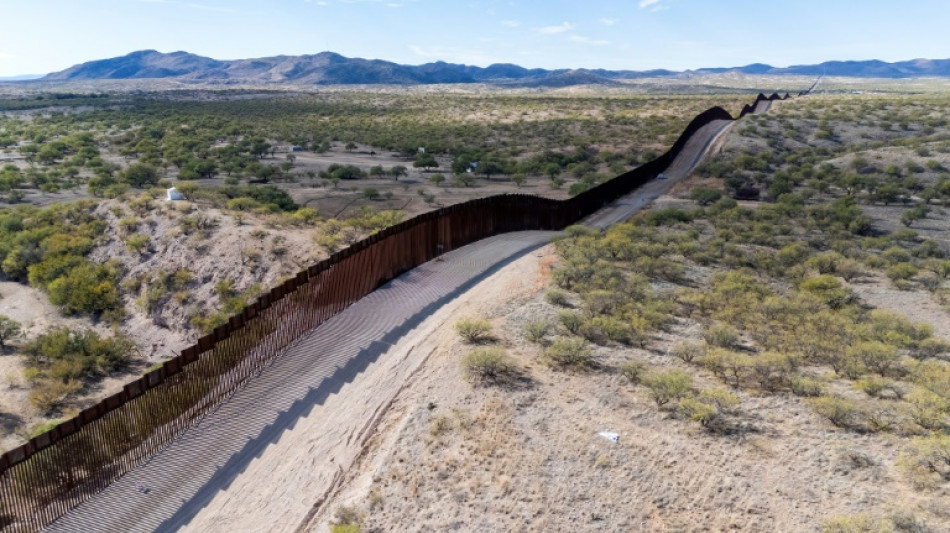
-
 Back to black: Philips posts first annual profit since 2021
Back to black: Philips posts first annual profit since 2021
-
South Korea police raid spy agency over drone flight into North
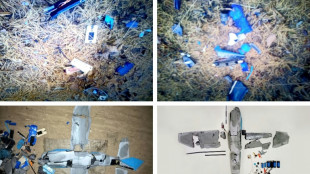
-
 'Good sense' hailed as blockbuster Pakistan-India match to go ahead
'Good sense' hailed as blockbuster Pakistan-India match to go ahead
-
Man arrested in Thailand for smuggling rhino horn inside meat
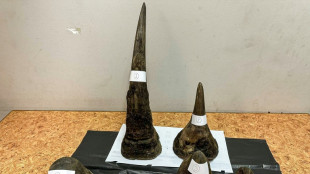
-
 Man City eye Premier League title twist as pressure mounts on Frank and Howe
Man City eye Premier League title twist as pressure mounts on Frank and Howe
-
South Korea police raid spy agency over drone flights into North
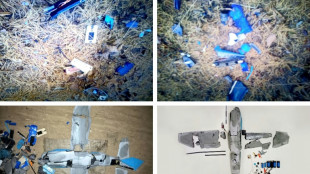
-
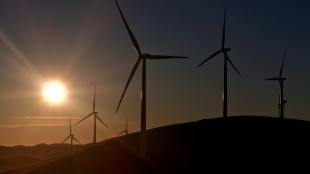 Solar, wind capacity growth slowed last year, analysis shows
Solar, wind capacity growth slowed last year, analysis shows
-
'Family and intimacy under pressure' at Berlin film festival

-
 Basket-brawl as five ejected in Pistons-Hornets clash
Basket-brawl as five ejected in Pistons-Hornets clash
-
January was fifth hottest on record despite cold snap: EU monitor

-
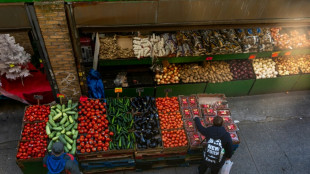 Asian markets extend gains as Tokyo enjoys another record day
Asian markets extend gains as Tokyo enjoys another record day
-
Warming climate threatens Greenland's ancestral way of life
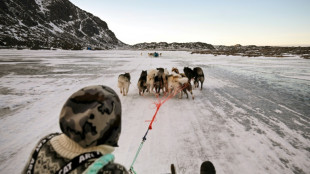
-
 Japan election results confirm super-majority for Takaichi's party
Japan election results confirm super-majority for Takaichi's party
-
Unions rip American Airlines CEO on performance

-
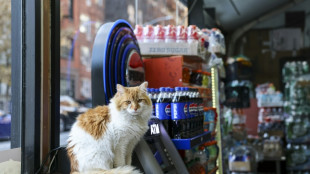 New York seeks rights for beloved but illegal 'bodega cats'
New York seeks rights for beloved but illegal 'bodega cats'
-
Blades of fury: Japan protests over 'rough' Olympic podium

-
 Zelensky defends Ukrainian athlete's helmet at Games after IOC ban
Zelensky defends Ukrainian athlete's helmet at Games after IOC ban
-
Jury told that Meta, Google 'engineered addiction' at landmark US trial

-
 Despite Trump, Bad Bunny reflects importance of Latinos in US politics
Despite Trump, Bad Bunny reflects importance of Latinos in US politics
-
Hemogenyx Pharmaceuticals PLC Announces Issue of Equity

-
 How Fort Myers Dentists Create Long-Term Care Plans for Healthy Smiles
How Fort Myers Dentists Create Long-Term Care Plans for Healthy Smiles
-
Nikon Introduces the ACTION and ACTION ZOOM Binoculars

-
 Australian PM 'devastated' by violence at rally against Israel president's visit
Australian PM 'devastated' by violence at rally against Israel president's visit
-
Vonn says suffered complex leg break in Olympics crash, has 'no regrets'

-
 YouTube star MrBeast buys youth-focused banking app
YouTube star MrBeast buys youth-focused banking app
-
French take surprise led over Americans in Olympic ice dancing

-
 Lindsey Vonn says has 'complex tibia fracture' from Olympics crash
Lindsey Vonn says has 'complex tibia fracture' from Olympics crash
-
US news anchor says 'hour of desperation' in search for missing mother

-
 Malen double lifts Roma level with Juventus
Malen double lifts Roma level with Juventus
-
'Schitt's Creek' star Catherine O'Hara died of blood clot in lung: death certificate

-
 'Best day of my life': Raimund soars to German Olympic ski jump gold
'Best day of my life': Raimund soars to German Olympic ski jump gold
-
US Justice Dept opens unredacted Epstein files to lawmakers

-
 Epstein taints European governments and royalty, US corporate elite
Epstein taints European governments and royalty, US corporate elite
-
Three missing employees of Canadian miner found dead in Mexico

-
 Meta, Google face jury in landmark US addiction trial
Meta, Google face jury in landmark US addiction trial
-
Winter Olympics organisers investigate reports of damaged medals

-
 Venezuela opposition figure freed, then rearrested after calling for elections
Venezuela opposition figure freed, then rearrested after calling for elections
-
Japan's Murase clinches Olympic big air gold as Gasser is toppled

-
 US athletes using Winter Olympics to express Trump criticism
US athletes using Winter Olympics to express Trump criticism
-
Japan's Murase clinches Olympic big air gold

-
 Pakistan to play India at T20 World Cup after boycott called off
Pakistan to play India at T20 World Cup after boycott called off
-
Emergency measures hobble Cuba as fuel supplies dwindle under US pressure

-
 UK king voices 'concern' as police probe ex-prince Andrew over Epstein
UK king voices 'concern' as police probe ex-prince Andrew over Epstein
-
Spanish NGO says govt flouting own Franco memory law
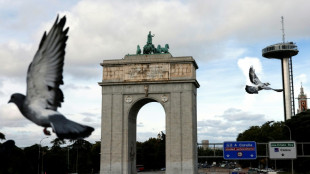
-
 What next for Vonn after painful end to Olympic dream?
What next for Vonn after painful end to Olympic dream?
-
Main trial begins in landmark US addiction case against Meta, YouTube

-
 South Africa open T20 World Cup campaign with Canada thrashing
South Africa open T20 World Cup campaign with Canada thrashing
-
Epstein accomplice Maxwell seeks Trump clemency before testimony

-
 Discord adopts facial recognition in child safety crackdown
Discord adopts facial recognition in child safety crackdown
-
Some striking NY nurses reach deal with employers


US-Mexico border wall threatening rare wildlife
Jaguars don't understand borders, but where the United States meets Mexico, they are having to adapt to them.
Once the master of the Sonoran Desert, the animal is now struggling to survive in a landscape cut in two by a wall.
The barrier, which former US president Donald Trump boasted he would make "impenetrable," does little to discourage the thousands of people from Latin America, Asia, Africa and Eastern Europe who arrive in the country every day, fleeing poverty and persecution.
But, say conservationists, the fencing erected by successive administrations in Washington is deadly to wildlife.
"One of the most important things for the health of ecosystems is habitat connectivity," says Laiken Jordahl from the Center for Biological Diversity.
"Animals need to be able to roam, to find food, water, to find mates. Having wide expanses of connected landscape is critical."
A metal fence rises 30 feet (9 meters) at the southern edge of the Buenos Aires National Wildlife Refuge, a 117,000-acre (47,000-hectare) home for threatened and endangered plants and animals in Arizona.
The barrier marks the end of the United States, but not the end of the habitat for dozens of species, including American antelope, mule deer, lynx, mountain lions and jaguars.
"This wall is clearly going to sever this entire ecosystem from all of the wild lands in Mexico that will make animals on this side and that side of the wall more vulnerable to drought, to climate change, to inbreeding," Jordahl said.
Scientists think there are about 150 jaguars on the Mexican side; there have been only seven documented sightings on the American side in recent decades.
"One individual jaguar can roam hundreds or thousands of acres, they can walk hundreds of miles in a matter of days. They need massive landscapes available to them," said Jordahl.
"Jaguars are coming up to Arizona from Sonora in Mexico, but a lot of them are being met with a solid border wall."
- 'Undercutting' -
A physical barrier at the US-Mexico border has been in the works for decades along stretches of the 2,000-mile (3,000-kilometer) frontier.
It is present in national parks, nature reserves and on indigenous lands in Texas, New Mexico, Arizona and California, ending a few yards (meters) out into the Pacific Ocean.
Each piece of the jigsaw reveals the administration that put it there -- Trump's section of wall, for example, stands the highest, a reflection of the Republican's signature pledge to shutter the border.
Trump's White House repealed or circumvented rules designed to lessen environmental impacts, causing "irreparable" damage in nature reserves and on indigenous lands, according to a report released in September by the Government Accountability Office, the auditing arm of Congress.
Democrat Joe Biden halted the expansion of the wall when he came to office in 2021, but in October his administration authorized the closing of some gaps, mainly in Arizona.
For Jordahl, the rush to erect the barrier undermined years of careful conservation work by the government.
"The federal government has put hundreds of millions of dollars into protecting landscapes around the border, into recovering animals like the Mexican gray wolf and the jaguar.
"But at the same time, they're undercutting all of those goals by building this impermeable structure that stops... migrations dead in their tracks.
"Essentially, we're pulling thread after thread out of this patchwork that is the intact ecosystem," said Jordahl.
"It's only a matter of time until it all does start to unravel."
Ch.Havering--AMWN


